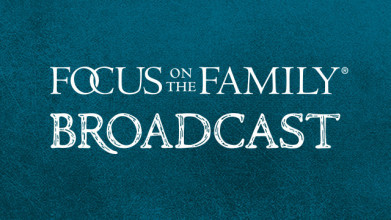John Fuller: What kind of things stress you out? This is Focus on the Family, and today, we’ll be talking about some stress triggers and, uh, how you can manage them. I’m John Fuller, and your host is Focus president and author, Jim Daly.
Jim Daly: John, with all the news we see every day, uh, we are bombarded with situations and circumstances that leave us feeling anxious and worried. And I think it’s wise to talk about that, especially as Christians. I know when I’m feeling a little out of normal, uh, you know, I’ll find comfort in the words of Jesus, right from the gospel of John, where the scripture says in chapter 16, verse 33, “In the world, you will have tribulation, but take heart. I’ve overcome the world.” That’s an awesome scripture of confidence and calm.
Jim: Uh, it’s good news for all of us. And that’s where we can live and rest knowing He has overcome the world. Uh, here at Focus on the Family, we wanna remind you of God’s love. So, you can live in that freedom. Uh, in His grace and power, you can do all things, even conquer anxiety. And of course, we’re talking about those normal things of anxiety, not, uh, clinically diagnosed anxiety or depression. That’s a different topic. Today, we’re just going to discuss the normal everyday weight and worry of the world and what it puts on us.
John: Mm-hmm. Yeah. And we have a great guest, uh, here to help us, uh, dig into this and get some great encouragement. Uh, Deborah Pegues has written a book called 30 Days to Taming Worry and Anxiety. Uh, we have that here at the ministry. I’ll give the phone number in just a moment. Deborah is a Bible teacher, a speaker internationally. She’s a certified behavioral consultant. She’s been in the business world. She’s got a great resume, but she’s got a big, big heart. And that makes her really exceptional. Um, and as I said, this book 30 Days to Taming Worry and Anxiety, we do have copies of that here at the ministry. Just call 800, the letter A, and the word FAMILY, or stop by focusonthefamily.com/broadcast.
Jim: Deborah. It’s great to have you back at Focus.
Deborah Pegues: Thank you so much. I’m just delighted to be here.
Jim: You just brighten every room you walk into.
Deborah: (laughs).
Jim: I would just love to hang out with you.
John: Yeah.
Deborah: (laughs).
Jim: (laughs). It’s so much fun when you’re here.
Deborah: I love life.
Jim: And you, you bring, you know, such great wisdom, right from the scripture and you hit a lot of the pain points that people are feeling in this culture. And then I think is a great place to start. So often now conversations are about how anxious people are today. How worried people are today. Do you think with all your interactions, is it worse today than it was 40 years ago? Or are we just as human beings in this world, in the flesh prone to being worried and anxious?
Deborah: I think it’s both. We, we are prone to being anxious, uh, and then whatever the situation is that’s bringing pressure to bear, it’s just increasing the anxiety. And, and 2020 was a year that was just anxiety written. And, um, I like to always quote the scripture because the Bible says, “Be anxious for nothing.”
Jim: Right. (laughs).
Deborah: And it didn’t say except.
Jim: Right.
Deborah: (laughs). “Be anxious for nothing.” And I’m thinking, what is anxiety? Anticipating a negative outcome. I have to remember that anxiety is anticipating a negative outcome.
Jim: Mm-hmm.
Deborah: I’m anticipating something to go wrong. I, I was driving on the freeway and I, I, I can drive in a special lane by myself going into Los Angeles because I have this little sticker on my car and I told my husband, “But I don’t like that special lane because everybody’s going really fast.” And he said, “Well, so what’s the problem.” “Well, I’m anxious that somebody’s gonna cut in front of me.” And so, he said, “Well, why don’t you focus on thinking that they won’t cut in front of you?” (laughs). I said, “Well, that’s a novel approach,” but, you know, but it was the anxiety.
Jim: Yeah.
Deborah: And I have to ask myself, what are you believing? What are you thinking? And that’s it. Yeah.
Jim: You know, there’s, there’s a word that people have now coined called catastrophizing.
Deborah: Mm.
Jim: And that is part of it. I mean, even the fact that we’ve now created this word in the last few years, that people catastrophize things.
Deborah: Yeah.
Jim: Um, that’s pointing to higher anxiety, right?
Deborah: It is. And we have, that’s why we have to pay attention to what we’re thinking about. (laughs). Think about what you’re thinking about. Now, that sounds like double speak. Think about what you’re thinking about, because if that’s your space, if you believe you gotta, you know, we gotta really get back to this thing about what we believe, ’cause it really impacts every area of our lives.
Jim: Mm-hmm.
Deborah: And so, when I think about, when I’m thinking about like when I was flying here and I, I was getting anxious, ’cause I hadn’t been on a plane in 20 months, I was getting really anxious and I’m thinking, well, what, what are you thinking? I’m thinking the plane might crash. I’m thinking we may have turbulence; I didn’t think I was gonna crash. I just don’t like the turbulence. I was fearing the fear. I was, I was anxious about feeling fearful. (laughs). How crazy is that?
Jim: Yeah. Well, and you know, I wanna be respectful of those emotions because some people, I mean, they really struggle with this.
Deborah: Well, they do.
Jim: And, you know, from time to time, Jean fits into that category. So, I’ve lived very closely to that kind of anxiety and that feeling that the worst is going to happen.
Deborah: Mm-hmm.
Jim: Um, how does a person get on top of that though? I think it’s a lifelong struggle for many people.
Deborah: It’s a lifelong habit. We have to develop not doing that, and lest I do so sound like a walk-in Bible. When we embrace the Bible-
Jim: Mm-hmm.
Deborah: … that, you know, it’s gonna work together for my good. I’m not gonna be anxious for anything. God is able to do abundantly above. I could ask or think. I… if I don’t replace those thoughts with those negative thoughts, you see Jim, the mind we, we learn in physics that no two forms of matter can occupy the same space at the same time. You can’t think those negative thoughts and positive thoughts at the same time. So, when I, when they bombard me, I try to have something to replace them.
Jim: Yeah.
Deborah: I just replace that negative thought. I cast it down. That’s a command in the Bible. Cast down those imaginations. They’re rising up against what I know about God. And I just think we gotta start to practice doing that. And, and it’s, it is a daily, I don’t like to call it a struggle. It’s a daily challenge.
Jim: Or a daily discipline.
Deborah: A daily discipline. I like that even better.
Jim: Doing that even better.
Deborah: Yeah.
Jim: In fact, let’s get to a specific-
Deborah: Okay.
Jim: … because in your book you talk about your own stressful situations and you describe a time when you had a, a stressful day. I think it involved a phone call from your brother, what happened? And I think this will loop a lot of people in because many people go through experiences with their family.
Deborah: Well, my mom was, uh, she’s passed away now, but she had dementia and we had a brother who had, um, had a battle with drugs, but we were… the city had, they had a program where they would pay him to watch her, but he wasn’t doing a good job of it. And I had a board meeting coming up and I was just at the beginning stages of a condition called trigeminal neuralgia. One of the most painful diseases known to man. And it was just at the beginning of that. And it was a board meeting day. So, I’m trying to get ready, and my brother calls, and he said, “Nobody’s picked up my mom’s medicine.” And, and, and about that time, my staff person came in to give me some financial statements to review for the meeting and I could immediately see errors. And, and then I had this pain hitting me. It was so much at once. I’m like, Jesus, can you just come now, rapture come please. Somebody do something.
Jim: So, it was overwhelming.
Deborah: It was overwhelming. And I don’t like to use that word overwhelming, but that was the time it really was overwhelming. So, I just, I just stopped and just took a deep breath. And I just say, “God, just cast this care up on you and just show me what to do next.” And sometimes when we’re really stressed and overwhelmed-
Jim: Mm-hmm.
Deborah: … that’s because we’re trying to do so much. We’re trying to do so much at once. And I like to just stop and say, God, what to do next? Even if it’s the next hour. And sometimes we can get so stressed, we kind of have to live life by the hour. Lord, what’s my priority for the next hour?
Jim: You know? And Deborah, so much of your advice in a variety of categories as we’ve, you know, had several discussions with you on different books that you’ve written, it comes down to capturing what your behavior is. And I, I like that. It’s a discipline. I don’t typically utilize.
Deborah: Mm-hmm.
Jim: You know, I do it in my mind. One of the things you recommend in your book is to identify those things that are causing you stress, the stressors in your life.
Deborah: Yes. Yes.
Jim: I’ll do that mentally, but I won’t give it enough time and I really like the discipline that you bring to-
John: Mm-hmm.
Jim: … to say write them down.
Deborah: Oh, yeah.
Jim: So, what does that list look like for you?
Deborah: Well, I’ll write it down. Like, let’s just say today. What, what are my biggest stressors? I have a client’s financial statements due when I get back home. I need to promote my other book better, blah, blah, blah. Then I’ll say, okay. And then there’s some other things. I have a friend who’s fighting for her life. I can’t control that; I can pray for her. So, I’ll make down, I’ll write a list of things that I have that are within my realm of influence and things that are outside of my realm of influence. The things that are outside, I give them to God. I’ll just pray about them and that’s all I can do.
Jim: Yeah.
Deborah: That’s all I can do. The things that are within my realm of influence, I make a priority list. What should I work on first? What’s most important, because sometimes you can just find yourself reaching for things to do when you have so much to do. And everybody has so much to do. I don’t know anybody who doesn’t have a lot to do. (laughs).
Jim: Yeah. Do you feel the benefit of writing that down helps capture and contain the anxiety?
Deborah: Oh, absolutely.
Jim: Because now it’s on paper. You can see it.
Deborah: Yes, now on paper, and I feel like I’m not outta control.
Jim: That’s interesting. I’ve never thought of it.
Deborah: Yeah. I, I, I can have it under control, and I, and this may not even be relevant some… for some theologians, but we know that scripture that talks about write the vision and make it plain so that you can run with it. I just kinda write it down what I wanna do. And then I say, okay. And then I don’t put too many major stressors on my list in the course of a day. You know, you shouldn’t have 10 things and listen, I have two to do lists. One says to do, and then another one says to do today. (laughs).
Jim: Yeah. Right. The, the real fast things you gotta do.
Deborah: Yeah. Right. Right. And I don’t put too many on there. Just do as much as you can.
Jim: Yeah.
Deborah: Yeah.
Jim: And I appreciate that. Um, you suggest in order to effectively deal with, uh, stress and lessen anxiety, which is what we’re talking about, John.
John: It’s the goal.
Jim: Uh, we need to have a secure foundation.
Deborah: Yes.
Jim: Now, not everybody listening is a believer in Christ.
Deborah: Okay.
Jim: And we’re really talking about that. The 80% of the audience that does believe in Jesus.
Deborah: Yes.
Jim: That’s number one. That’s foundational. But, you know, describe that four-legged stool and have that listener in mind who may not have a relationship with Christ.
Deborah: And we’re hoping that we can make them so excited about how we’re faring in having a good, strong foundation that, that other 20% will wanna embrace Christ.
Jim: Absolutely.
Deborah: Because he really is the prince of peace.
Jim: It’s a great way to live your life.
Deborah: It really is.
Jim: (laughs).
Deborah: I, I can’t imagine living this life in my own strength.
Jim: Right.
Deborah: And that is one of the great benefits.
Jim: That will create anxiety.
Deborah: Oh, goodness. Because, you know, self is so limited, but I, I say life is like a stool and the base is what you believe, your spiritual foundation. And there are four major pillars of life, the physical, the relational, the emotional and the financial. Every problem you have in life will eventually find its way in one of those four categories. But what we believe will flow down and impact how we behave, manage in those areas. Let me give you an example. Let’s say financially, if I believe that God’s gonna supply all my needs, I believe in tithing. I believe that if I give others will give unto me. So, see, that’s a belief and it’s impacted my behavior. That’s why I always say the scriptures are practical, be- because they tell you what to do. And so, it’s, you have to know when then you have embraced an erroneous belief, ’cause sometimes you believe in something that is not gonna work on your behalf and they’re impacting those areas.
Jim: Huh.
Deborah: And so that’s why I say, okay, so look at the physical, you need rest. Look at the relational, and I don’t need to be in conflict with people. I need to not walk in unforgiveness. That’s stressful. I’m always thinking about a person who’s offended me. They’re, they’re controlling my life. So, if I just release them, you know, ’cause I believe I should, based on the scriptures, I need to release everybody. I need to forgive. And so that impacts how I run my relationships. So, so I’m sure, I hope I’ve made the point that watch what you been believing, do a beliefs audit. Sometimes I’ll just do a beliefs audit. You can tell, I like writing things down.
Jim: Yeah.
Deborah: So, I’m always analyzing, what am I believing about that? Is this an alignment with the word of God? If it’s out of alignment, I’m gonna have trouble in one of those pillars of my life.
Jim: The other thing I love about what you express is your own, your own shortcomings. I, I so appreciate that about you. Uh, you mentioned in the book that you were distracted from (laughs) prayer because you were looking for a CD, and you know, it just consumed all your time. Describe that, that event because I so relate to that. Like I, I have this thing to do and then I get caught up in fixing something.
Deborah: Yep. Yep. And the distractions are so many until it’s, we, it’s hard to pray. It’s hard to memorize the word, but I’m committed. I’m trying to be committed to praying an hour, but I, I’m not there some days. So, this particular day I said, okay, I’m ready. I have my worship album. I’m just gonna get ready. I got down on my knees and I didn’t have the CD that I want to listen to. I said, okay, let me run down, it’s probably in the trunk of my car. This is when we were using CDs. I looked in the car and there was, it wasn’t there. But I, the, the trunk was in disarray. So, I organized it while I was there.
Jim: (laughs).
John: (laughs).
Deborah: So, then I said, it’s probably on my desk. I went to my desk, and I looked there and there were papers everywhere. And I, I didn’t see it-
John: (laughs).
Deborah: … but there was a plant over there with a yellow leaf. And I said, let me just water the plants since I’m right here.
John: (laughs). Okay.
Deborah: And, and then since I’m right here, let me just check a couple of messages. Bottom line was by the time I got back to the prayer room, I had about five or 10 minutes left on my prayer time. And I said, oh, man, this isn’t working. And I just didn’t have time to enter into the presence of God. And let me tell you, that is key for peace.
Jim: Yeah.
Deborah: You need to enter into the presence of God every day. So, you can cast those cares up on him, feel empowered for the day. That is so important.
Jim: Yeah. And it’s so hard for us to do as a discipline.
Deborah: It is, it is.
Jim: I mean, the yellow leaf will be there after your prayer time.
Deborah: (laughs).
Jim: You can take care of it then.
Deborah: Yeah.
Jim: But again, I so identify with that.
John: Mm-hmm.
Jim: Um, let’s also have you describe how, how we should take care of ourselves? It, it sounds funny, even a little uncomfortable to talk about this idea of self-care, but-
Deborah: I know.
Jim: … but it’s important, and we benefit from that. I think Jesus demonstrated that so beautifully.
Deborah: Oh, my goodness.
Jim: I mean, you think about it. Jesus was here, healing people, taking care of emotional needs, spiritual needs, physical needs, and he could have gone 24/7. Right?
Deborah: Yes.
Jim: But no, he peeled away and he-
John: Mm-hmm.
Jim: … sought rest and got away from the crowd so that he could revitalize. And he’s the son of God.
Deborah: Yes.
Jim: So, I mean, if it’s good for him, it’s gotta be good for us.
Deborah: It’s gotta be good for us. I don’t know why we ignored that example. I, I remember when the disciples came, I don’t remember, but I read when the disciples came (laughs)-
Jim: (laughs). Well, I tell you, you’re not that old.
Deborah: Yeah, I’m not that old.
Jim: (laughs).
Deborah: I’m old, but I’m not that old, but they came back to Jesus, and they told Him all that they had done and taught, and I thought he would’ve said, at it, boy, get back out there and he said, “Y’all need to go rest.”
Jim: Yeah.
Deborah: Go get some rest.
John: Mm-hmm.
Deborah: Say… the Bible says, they had no leisure. Jim that’s critical. They used the word leisure in the King James version of the Bible, for they had no leisure. Leisure is sp- is spiritual. We don’t see leisure as being spiritual, but it is.
John: Uh, you’re listening to Focus on the Family with Jim Daly. I’m John Fuller, and our guest today is Deborah Pegues. And uh, we’re unpacking just some of the concepts, many, many great concepts in her book, 30 Days to Taming Worry and Anxiety. Uh, we do have copies of that here at the ministry, other resources as well, to help you in your faith walk. Just stop by focusonthefamily.com/broadcast or call 800, the letter A, and the word FAMILY.
Jim: You know, Deborah, in this modern world, there’s so many distractions and it, it’s almost like industries feed off of that. Whether it’s media, what have you? I, I’m thinking of gaming. That’s been a struggle with two boys in the home growing up as teenagers, you know, they wanted to play shoot em’ up games and those kinds of things.
Deborah: (laughs).
Jim: Um, what’s happening there? And how do we get a handle and replace seeking the distractions with facing what’s real and then dealing with it?
Deborah: Well, I think it’s probably gonna be too hard to go cold turkey. So, what you’re gonna have to do initially is just to back it down a little bit. (laughs).
Jim: Right. That’s true for all of us.
Deborah: Yeah. All of us. And, and with social media, I can find myself being… I can spend too much time on Facebook. And so, I just suggest that, you know, we learn how to be in the present, that we have times that we, we put on ourselves on the calendar, you know, you put yourself on the calendar, you make a commitment. So, when somebody asks you to do something, you say, I’m sorry, I have another commit me or I have an appointment. Well, I do, it’s with myself. (laughs).
Jim: (laughs). You don’t have to give them all the information. No, I appreciate that. Deborah, another concept that you mentioned is this idea of flexibility, uh, reducing one’s anxiety. I can relate to that.
Deborah: (laughs).
Jim: I appreciate that because I think that’s true. Sometimes that can be a personality bent though. You know, a rigid person, a black and white thinker.
Deborah: Mm-hmm.
Jim: They’ll struggle more than someone who can be in the gray, you know? It’s okay.
Deborah: Yeah.
Jim: I don’t mind. That’s flexibility but speak to why flexibility allows you to be less anxious.
Deborah: Well, I heard something that said that a flexible person would not be bent out of shape. (laughs).
Jim: (laughs). Okay. That’s good.
Deborah: Okay. Well, well, you see, because when you think about it, when you’re not flexible, who’s suffering? Pretty much you are, because you’re the one that’s going through all the inner turmoil. Why are they doing it like that? I planned it like this, won’t they just do it the way I said it? I, I tend not to allow a lot of margin in my time. And then I’m like, well, why are they going so slowly? Why, why are they speaking so slowly? I hadn’t planned for all of this. And it’s like, you know what, if you learn to just to go with the flow, we, we have a friend who does that, and he just seems so calm all the time. He doesn’t get upset. He doesn’t ask a lot of why people are doing that. I challenge you to do that, to just, you know, take a deep breath and just be in the moment and just say, it is what it is. You know, there’s something about that. It just is what it is.
Jim: Another area you mentioned in the book is expectation.
Deborah: Yeah.
John: Mm-hmm.
Jim: And this, I mean, I’m telling you folks, this for Christians, this is a core thing because we put so many expectations on ourselves, on our spouse, on our kids.
Deborah: Yes.
Jim: That, you know, they can only fail.
Deborah: Yeah.
Jim: ‘Cause no one’s perfect.
Deborah: No, one’s perfect. And, and we have this, these “shoulds”, you know, I should.
John: Mm-hmm.
Deborah: And I tend to put my, uh, put a lot of, of expectations on myself as a wife, especially being a, let’s say, a career woman or a woman who’s busy. I make sure I have food at home. And Darnell says, “I can make my own food, really. I don’t require that of you.” I’m like, “No.”
Jim: I like Darnell. (laughs).
Deborah: No, I’m like, no, I… No. You know.
Jim: Him, him and I, we’re gonna eat peanut butter and jelly sandwiches. (laughs).
Deborah: But I, but I think I don’t want, I don’t want anybody to ever say, “She was so busy trying to pursue her career. She didn’t take care of a home.” So, I put that on. But listen, and our expectations are either unreasonable sometimes or unexpressed.
Jim: Let me ask you this though, why do we create those expectations? What in us is driving us to expect more outta you than you expect outta yourself?
Deborah: Our own values that have been shaped by our culture sometimes. Well, I should do this. You, you gotta watch those shoulds in your life. Watch the shoulds that people bring to you, but watch the shoulds that you have, like a man should take care of this. A man should take care of that. And, and I believe that we, I think men should be responsible. (laughs).
Jim: Yeah.
Deborah: You know, I… once we were watering the plants or something Darnell said, “I shouldn’t have to water plants.” I’m like, “They’re our plants, they’re in the house.”
Jim: (laughs).
John: (laughs).
Deborah: They’re everybody’s plants. What, what’s these role things. But you know what, it’s okay. Because now he waters plants. But you know, you, you have to express your expectations, ’cause sometimes you’ll be frustrated and anxious because you had an expectation that you didn’t let anybody know you had that and you are just thinking, they should know.
Jim: Well, the irony is, I think most of marital conflict is right here in this area of expectation.
Deborah: Absolutely. That’s… Yeah, yeah.
Jim: What do I think needs to happen, what the husband thinks needs to happen, and they don’t talk about it.
Deborah: Well, you gotta talk about it, you know, in a calm way, you know, in a calm way. I lost something at the hotel the other day and I was thinking, but Darnell’s with me traveling, I, I think he should make sure I don’t leave anything in the room. Like why should he do that? (laughs).
Jim: (laughs). Well, I think it’s a good idea.
John: (laughs). Maybe it’s a strength of his, you know, this whole expectation thing. Dena and I just a couple of, uh, weeks ago, we’re talking about this because she’s been doing something that she thought she should do as my wife.
Deborah: Yep. Yep.
John: And we had to unpack that and it, it goes way back to when she was growing up and she watched her mom and she thought that I’ve been expecting her to do this thing this whole time. And it’s like, I never have thought about that.
Deborah: Yep.
John: So, doing that self-inspection that you’ve talked about before, that’s really key here, isn’t it?
Deborah: Yeah. It is. And putting it on the table in a, in a non-offensive way.
Jim: Yeah.
Deborah: To say, what are your expectations of me and what am… you know, these are my expectations of you. And then you negotiate those. Like I’m not expecting that. I wasn’t really planning to do that. But if that’s what you need, you know, let’s, let’s that out. Yeah.
Jim: Yeah. It’s a far healthier way than saying-
Deborah: Oh, it is.
Jim: … other things that you can say. (laughs).
Deborah: (laughs).
John: (laughs).
Jim: Like, what are you expecting me to do?
John: We’ll do that in another program. We’ll cover that stuff.
Jim: That’s another show, right?
John: Yeah.
Deborah: (laughs).
Jim: Um, how can we set the tone for the atmosphere around us, especially in the presence of those that lean into anxiety? What’s our role as Christian with those that we love that are around us, family, friends who tend to be anxious people? Uh, what can we do to set the atmosphere, to make it healthier for them?
Deborah: Well, first of all, we can be a model of peace. We can model the peace that we want other people to have around us. And so that means in, even in our words, our responses. We don’t have to roll our eyes. We don’t have to go like good Lord. You know?
Jim: Man, I’m convicted on all that. Okay.
Deborah: (laughs).
John: Yeah.
Deborah: Watch your body language. Watch your words. We had a situation recently. I had my brother, though, was the first time since December 2019. And, and one of them was gonna be late and, and he was upset with us, but for whatever reason, but Darnell calmed him down so well, and we were, I was just ready for him. I was like, you know what, you just, that was just a silly thing you did. You drove up, you didn’t get out of the car. You should have knocked on the door. He left. And he was so upset. “Nobody was there.” “Did you knock on the door?” “No, I didn’t see any cars out front.”
Jim: (laughs).
John: (laughs).
Deborah: And so, Darnell, when he came, Darnell said, “Come on in, have some food.” He calmed him down. So, we gotta be that model of peace, ’cause I was ready to tell him that is just really crazy. (laughs).
Jim: Yeah.
Deborah: But that wasn’t gonna, you know?
Jim: Well, and so often when a person is expressing that kind of, it’s almost its eye catching or ear catching because it’s out of proportionality.
Deborah: Yeah.
Jim: There’s usually something else going on there. You’re the, you’re the beneficiary of some other problem that person-
Deborah: Yeah, yeah.
Jim: … is encountering.
Deborah: And that’s why the soft answer turns away the wrath. And we have to always remember that. It takes some discipline to give a soft answer when you are equally frustrated. (laughs).
Jim: Yeah.
Deborah: Yeah.
Jim: How about Steven being stoned to death and prays-
Deborah: Yes, yes.
Jim: … for those stoning him saying, “Lord don’t hold this against them.”
Deborah: Oh, I would’ve-
Jim: That’s the epitome of-
Deborah: I would’ve, I would’ve wanna go out to drop fire on him. (laughs).
Jim: Right. No kidding. Yeah. Bring in the military. Let’s go.
Deborah: Right.
Jim: But I mean, that does show you the spirit of God.
Deborah: Yeah.
Jim: And how effective He can be even in a life and death situation like that.
Deborah: Yes.
Jim: That, that area of scripture really captures me.
Deborah: Yeah.
Jim: Because Steven’s laying it all down right there.
Deborah: I know.
Jim: He knows what he’s going to and he’s not clinging to this.
Deborah: No. Amazing.
Jim: And wow, that’s helpful.
Deborah: It is.
Jim: You use an acronym, stress. Walk us through the stress model. How do you use that in a day-to-day way?
Deborah: Well, I got it from Jehoshaphat in the, in the 20th chapter of second Chronicles. And, uh, so when, you know, when they told him three armies were coming against him. And so, these are the things he did. First of, the S was seek God’s guidance. Always ask God what to do. Uh, the T is for trust what he tells you to do.
Jim: Mm-hmm.
Deborah: God says, “Listen, get the army, put the appraisers out front,” it made no sense. Just trust what God tells you to do. Uh, the R is remember past victories. There is nothing like getting, building your faith. And to remember, even if they weren’t your past victories, somebody had a victory. You need to be able to recount those. If you can’t go, go read a story in the Bible where there was a victory. (laughs).
Jim: Yeah. And that gives you confidence.
Deborah: Right.
Jim: Spiritual confidence.
Deborah: Absolutely. The E is for exalt God above the problems. Now, that sounds simple. But many times, we just, you know, we exhaust the problem above God. We bring God down to the level of the problem.
Jim: Mm.
Deborah: We hear somebody is dying from pancreatic cancer some will say, “Oh, no.” Well, God, that’s not too hard for God. So, exalt God above the problem. The S is solicit the prayers and support of others. Too many of us struggle in solitude. We don’t have to struggle alone. That’s what a brother is born for adversity. Ask people for help. It’s okay to ask for help. And then the other S is stand on the promises of God. Stand, stand.
Jim: Yeah.
Deborah: Amen.
Jim: Those are so good, Deborah. I mean, it, it just all fits together. Lastly, and I think we’ve had this discussion before, the importance of humor-
Deborah: Oh, yes.
Jim: … in all things and how to laugh at yourself, I, I think is really the first order, and then circumstances being second, but speak to the importance of laughing.
Deborah: Well, laughter’s like medicine and it is the best medicine when you are anxious and stressful. One day Darnell and I were, were about to pray and we joined hands and he said, “Father, we come before the “grown of thrace.”
John: (laughs)
Jim: (laughs).
Deborah: And, and I-
Jim: Thank you, Darnell. I do that all the time.
Deborah: I could not stop laughing. I couldn’t stop laughing. And you know, my body is shaking. I’m laughing so hard. And I told him later, I said, I said, “Why didn’t you just stop praying so I could get myself together.” He says, “I wasn’t gonna acknowledge the devil.” (laughs).
Jim: (laughs).
John: (laughs).
Jim: You guys have good open communication?
John: Yeah, yeah.
Deborah: Oh, we do. I thought it was so funny, but you know, you just gotta find the laughter. You gotta find the humor in something.
Jim: You do. And, and that sometimes if you’re not able to, that’s a place to start. What’s, what’s quenching your ability to laugh at some of these things and why.
Deborah: Yeah. And I’ve had some, some doozies, Jim, and I, I’m sure we’re wrapping up, but I was at a church speaking and I was about 10 minutes into my message and the, that one of the smoke machines they had used for the dancers, it came on right in the middle of my message.
Jim: (laughs).
Deborah: And I, and the stage is covered now with these clouds. And I, I’m like, that’s not part of the message. So, I just said, “Is this the point where I disappear?” (laughs).
Jim: Yeah. Right. (laughs).
John: (laughs).
Jim: Turn into a Tiger.
Deborah: And the pastor’s wife couldn’t stop laughing. (laughs).
Jim: Oh, man. No, that’s funny. Yeah. Whoop, cue the smoke.
Deborah: (laughs).
Jim: (laughs).
John: What a fun way to end this Focus on the Family conversation with Deborah Pegues.
Jim: Uh, man, Deborah is a firecracker. Every time she’s here, we laugh and get a solid reminder-
John: We do.
Jim: … of God’s best for us.
John: Mm-hmm.
Jim: You know, he does not want us to live in bondage or live with anxiety or stress. He wants us to trust Him and act in love to those around us. And we know some situations go beyond just laughing off those circumstances. And that’s one reason we have a team of caring Christian’s counselors on staff that you can call and, uh, go online even to set up an initial consultation, to speak with someone. Uh, they will listen to your specific need. They’ll pray with you and give you a pathway toward healing and most likely provide some resources for you, uh, books and other things that you can read to help your situation.
John: Yeah, that’s a great team. They’re there for you. And then we do have other resources of note, like Deborah’s book, 30 Days to Taming Worry and Anxiety. And we have that right here at Focus on the Family. So, get your copy from us and, uh, donate as you can to give families hope.
Jim: Every day we’re helping couples on the verge of divorce, families and crisis, bewildered parents, um, that have come to the end of their rope, frankly. Frightened mothers considering abortion. Uh, kids in foster care and the needs that they have and others who need the hope Jesus came to give them. And here, at the end of the year, we really need your help. Uh, let’s do ministry together. As we gear up for 2022, we want to save and strengthen even, and more families with scripture-based resources and programs. And when you give a gift of any amount today, we’ll send you a copy of Deborah’s book as our way of saying thank you. And right now, your gift will be doubled through a special year in matching opportunity provided by some generous friends of the ministry. And that means your gift will have even more of an impact, more ministry. So do that ministry by partnering with Focus on the Family. God’s going to do awesome things in 2022.
John: Yeah. We really believe that. And we invite you to join the team and donate and request your copy of 30 Days to Taming Worry and Anxiety. Look for details at focusonthefamily.com/broadcast or call 800, the letter A, and the word FAMILY. Join us tomorrow as we hear some words of wisdom, especially for men.






















